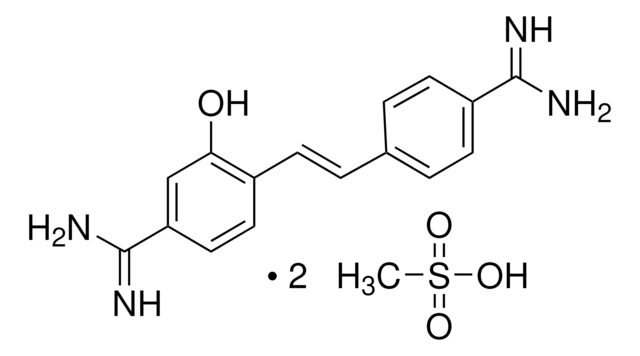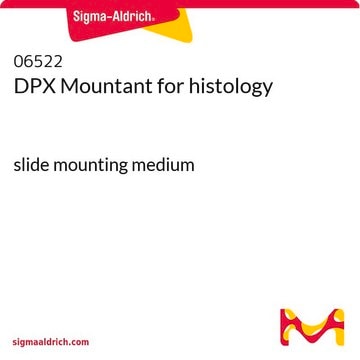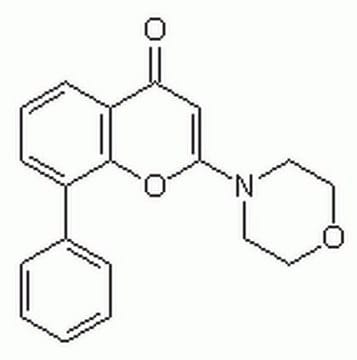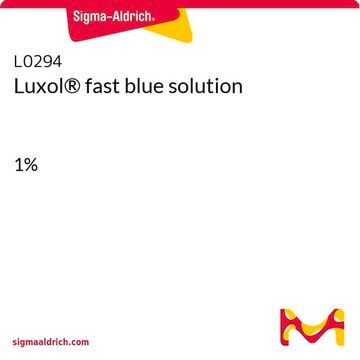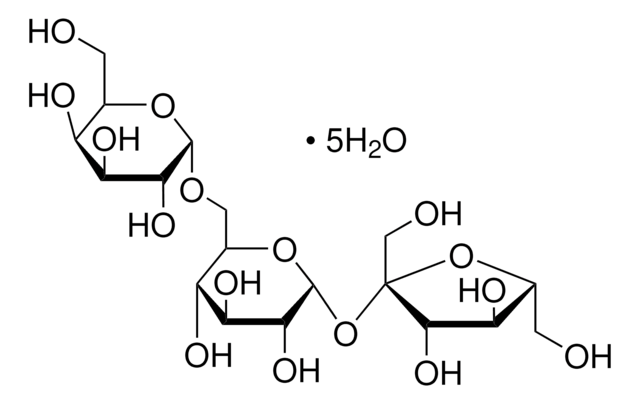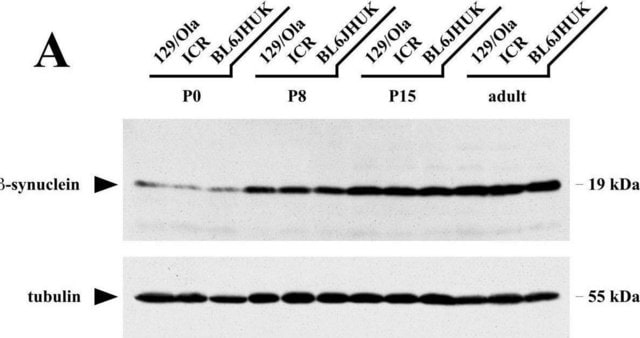おすすめの製品
フォーム
powder
分子量
Mw 823 Da
メーカー/製品名
Chemicon®
Fluoro-Jade®
テクニック
immunohistochemistry: suitable
蛍光検出
λex 485 nm; λem 525 nm
輸送温度
ambient
詳細
Fluoro-Jade C, like its predecessors, Fluoro-Jade and Fluoro-Jade B, were found to stain all degenerating neurons, regardless of specific insult or mechanism of cell death. Therefore, the patterns of neuronal degeneration seen following exposure to either the glutamate agonist, kainic acid, or the inhibitor of mitochondrial respiration, 3-NPA, were the same for all of the Fluoro-Jade dyes. However, there was a qualitative difference in the staining characteristics of the three fluorochromes. Specifically, Fluoro-Jade C exhibited the greatest signal to background ratio, as well as the highest resolution. This translates to a stain of maximal contrast and affinity for degenerating neurons. This makes it ideal for localizing not only degenerating nerve cell bodies, but also distal dendrites, axons and terminals. The dye is highly resistant to fading and is compatible with virtually all histological processing and staining protocols. Triple labeling can be accomplished by staining degenerating neurons with Fluoro-Jade C, cell nuclei with DAPI and activated astrocytes with GFAP immunofluorescence. Fluoro-Jade is a registered trademark of Histo-Chem, Inc.
Fluoro-Jade C, like its predecessors, Fluoro-Jade and Fluoro-Jade B, were found to stain all degenerating neurons, regardless of specific insult or mechanism of cell death. Therefore, the patterns of neuronal degeneration seen following exposure to either the glutamate agonist, kainic acid, or the inhibitor of mitochondrial respiration, 3-NPA, were the same for all of the Fluoro-Jadeâ dyes. However, there was a qualitative difference in the staining characteristics of the three fluorochromes. Specifically, Fluoro-Jade C exhibited the greatest signal to background ratio, as well as the highest resolution. This translates to a stain of maximal contrast and affinity for degenerating neurons. This makes it ideal for localizing not only degenerating nerve cell bodies, but also distal dendrites, axons and terminals. The dye is highly resistant to fading and is compatible with virtually all histological processing and staining protocols. Triple labeling can be accomplished by staining degenerating neurons with Fluoro-Jade C, cell nuclei with DAPI and activated astrocytes with GFAP immunofluorescence.
APPEARANCE: Coffee brown to brick red powder.
MOLECULAR WEIGHT: 823
EXCITATION PEAK: 485 nm
EMISSION PEAK: 525 nm
FILTER SYSTEM: Fluorescein / FITC
SOLUBILITY: Highly soluble in water and bases, moderately soluble in alcohol and weak acids.
TOXICITY: Although the compound appears to be of low toxicity, it has not been extensively evaluated and therefore routine laboratory caution should be exercised. Not intended for human consumption.
APPEARANCE: Coffee brown to brick red powder.
MOLECULAR WEIGHT: 823
EXCITATION PEAK: 485 nm
EMISSION PEAK: 525 nm
FILTER SYSTEM: Fluorescein / FITC
SOLUBILITY: Highly soluble in water and bases, moderately soluble in alcohol and weak acids.
TOXICITY: Although the compound appears to be of low toxicity, it has not been extensively evaluated and therefore routine laboratory caution should be exercised. Not intended for human consumption.
アプリケーション
FLUORO-JADE C has been used in:
- Fluoro-Jade C staining: to observe the pathological outcome of photothrombotic model after stroke
- to determine the direct neuronal death
- to evaluate neuronal degeneration in penumbra
- for brain cells to identify the damaged cells
- to assess neuronal injury
警告
Toxicity: Although the compound appears to be of low toxicity, it has not been extensively evaluated and therefore routine laboratory caution should be exercised. Not intended for human consumption.
ターゲットの説明
823
関連事項
Replaces: AG325
保管および安定性
The lyophilized powder should be stored well sealed at room temperature, preferable in a desiccator (due to its hygroscopic nature) for up to one year from date of receipt. The liquid stock solution (0.01%) in distilled water can be stored at 2-8°C for up to 3 months. The .0002-.0001% working solution in 0.1% acetic acid should be used within 4 hrs of preparation.
アナリシスノート
Silica TLC (acetanitrile/water, 6/4) revealed the presence of two fluorescent spots, presumably corresponding to the di sulphate homologues. The presence of precursors or free fluorescein was not detected.
法的情報
CHEMICON is a registered trademark of Merck KGaA, Darmstadt, Germany
FLUORO-JADE is a registered trademark of Histo-Chem, Inc.
保管分類コード
11 - Combustible Solids
WGK
WGK 2
引火点(°F)
Not applicable
引火点(℃)
Not applicable
適用法令
試験研究用途を考慮した関連法令を主に挙げております。化学物質以外については、一部の情報のみ提供しています。 製品を安全かつ合法的に使用することは、使用者の義務です。最新情報により修正される場合があります。WEBの反映には時間を要することがあるため、適宜SDSをご参照ください。
Jan Code
AG325-30MG:
試験成績書(COA)
製品のロット番号・バッチ番号を入力して、試験成績書(COA) を検索できます。ロット番号・バッチ番号は、製品ラベルに「Lot」または「Batch」に続いて記載されています。
この製品を見ている人はこちらもチェック
The TrkB-positive dopaminergic neurons are less sensitive to MPTP insult in the substantia nigra of adult C57/BL mice.
Yin-Xiu Ding,Yi Xia,Xi-Ying Jiao,Li Duan,Jun Yu,Xi Wang,Liang-Wei Chen
Neurochemical Research null
Time-course of neuronal death in the mouse pilocarpine model of chronic epilepsy using Fluoro-Jade C staining.
Lian Wang,Yong-Hong Liu,Yuan-Gui Huang,Liang-Wei Chen
Brain Research null
Characterization of a bilateral penetrating brain injury in rats and evaluation of a collagen biomaterial for potential treatment.
Paul Z Elias,Myron Spector
Journal of Neurotrauma null
Increased seizure susceptibility in mice 30 days after fluid percussion injury
Mukherjee S, et al.
Frontiers in Neurology, 28-28 (2013)
An organotypic spinal cord slice culture model to quantify neurodegeneration.
Madhumitha Ravikumar,Seema Jain,Robert H Miller,Jeffrey R Capadona,Stephen M Selkirk
Journal of Neuroscience Methods null
ライフサイエンス、有機合成、材料科学、クロマトグラフィー、分析など、あらゆる分野の研究に経験のあるメンバーがおります。.
製品に関するお問い合わせはこちら(テクニカルサービス)
